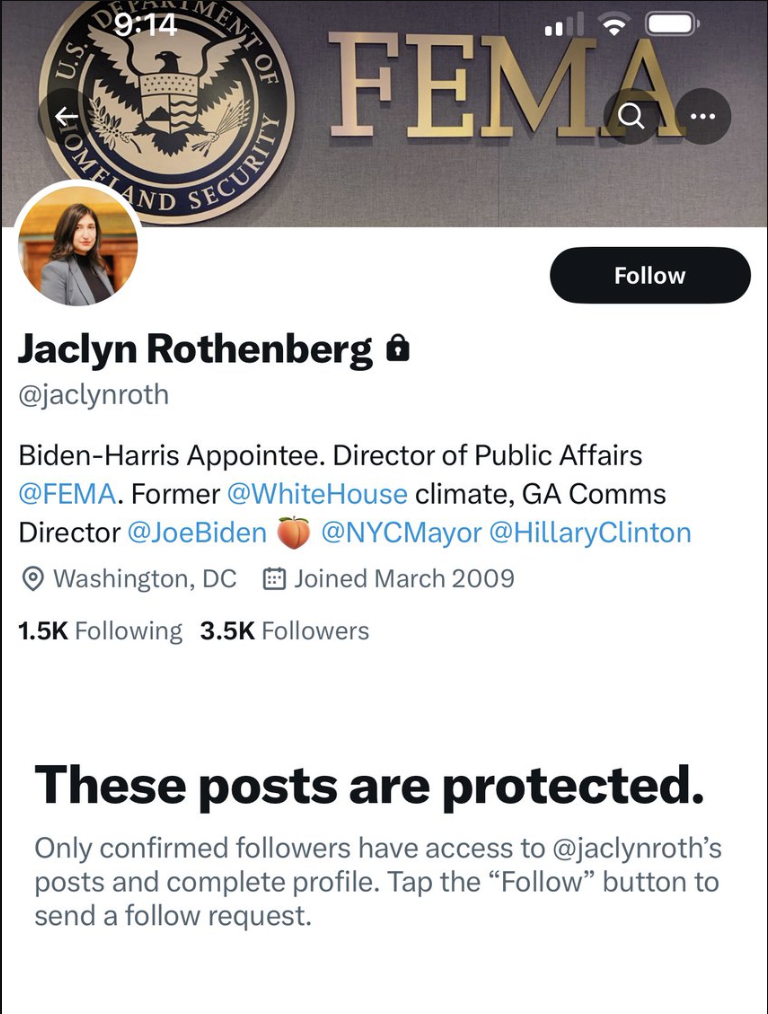The aftermath of Hurricane Helene has left residents in Bat Cave, North Carolina, struggling to navigate disaster recovery largely alone. FEMA Spokesperson Jaclyn Rothenberg has faced criticism for her social media activity, which has predominantly focused on attacking former President Donald Trump and discussing disinformation, rather than promoting FEMA’s response efforts or showcasing success stories. While communicating positive developments, such as FEMA assistance in South Carolina, Rothenberg’s messaging has been perceived as inadequate given the low average assistance amount of $824 per household. This sum seems particularly meager, considering the devastating impact of natural disasters on American families. Critics argue that the government’s priorities, which include providing substantial aid to illegal immigrants, shift focus away from the pressing needs of American disaster victims, further undermining faith in FEMA’s efficacy.
As the national conversation surrounding hurricanes continues, Hurricane Helene evokes memories of Hurricane Katrina, illustrating how past responses have shaped current expectations. The Federal Government and FEMA faced severe backlash for their handling of Katrina, with accusations of negligence landing on various local and federal officials. The comparison between these two disasters highlights how government preparedness and response are scrutinized, especially when communication and quick action are critical to saving lives. Inefficiencies that contributed to the chaos following Katrina serve as reminders that today’s officials must take responsibility and be held accountable for their actions, or lack thereof, in the face of disaster.
Current criticisms of the government’s disaster response emerge against the backdrop of substantial federal expenditures, such as the spending of $1.4 billion on aid for illegal immigrants, which some argue detracts from support allocated to American citizens affected by hurricanes like Helene. Local initiatives to help victims have reportedly faced legal challenges, with individuals attempting to provide assistance being threatened with arrest. The absence of coordinated federal rescue efforts further aggravates frustrations among citizens who feel neglected. As political strategists emphasize the sophistication of more affluent voters in metropolitan areas like Asheville, the narrative becomes fueled by a sense of elitism that seemingly abandons regions less politically aligned with the administration currently in power.
On another front, the wildfire disaster in Maui has similarly revealed shortcomings in the federal response. People question whether local officials were adequately prepared for the emergency, as a tragic death toll has brought the inadequacies of emergency management to light. Critics argue that FEMA’s preoccupation with disinformation tactics detracted from prioritizing effective assistance and transparency for those affected by the Maui fires. Random coincidences, such as the presence of the Chinese Daqi-1 Satellite over Hawaii during the crisis, have sparked investigatory queries that remain unanswered while citizens continue to deal with the fallout. This environment of suspicion suggests that the public’s trust in governmental processes is waning, obstructing immediate recovery efforts.
Looking at the case of the East Palestine train disaster further complicates the picture of federal disaster management in the U.S. The government’s response has been heavily criticized, particularly concerning the slow reaction and inconsistent communication among agencies. It has fueled perceptions of political bias in disaster response efforts, particularly given that East Palestine falls within a region largely supportive of Donald Trump. Local citizens have remarked upon the lack of attention from federal officials, which they interpret as a form of political negligence or punishment, a recurring theme that echoes back to the response to Maui and Hurricane Helene. Together, these instances pose questions about whether the government’s disaster response is politically influenced, or whether it pertains to a broader pattern of unpreparedness in emergency management.
Overall, these tales from Bat Cave, Maui, and East Palestine weave a narrative colored by frustration and calls for accountability in federal disaster response. Irrespective of individual political affiliations, the communal sentiment emerging from these crises is one of abandonment and exasperation towards a government that appears disconnected from the very citizens it is meant to safeguard. As the population deals with the compounded issues of disinformation, ineffective assistance, and perceived political negligence, it is imperative for federal agencies to realign their priorities with the primary goals of providing care, transparency, and robust emergency management. Ultimately, only through addressing these systemic failures can trust in governmental competence be restored, allowing affected communities to rebuild in confidence.

